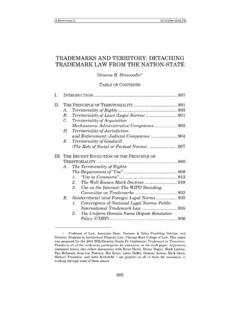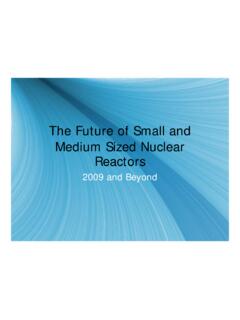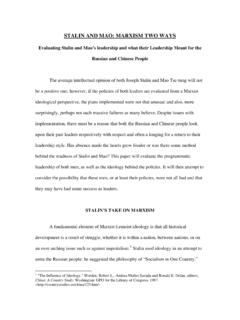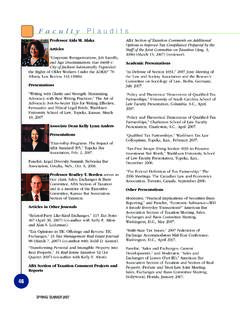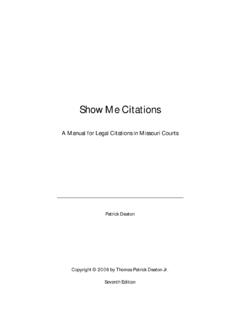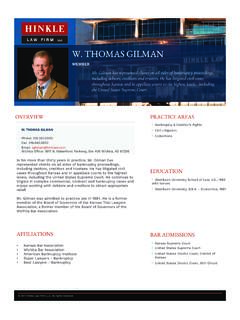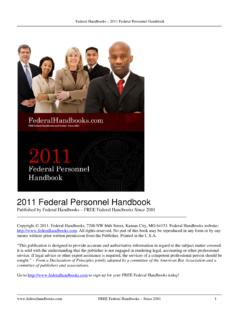Transcription of JUDICIAL CLERKSHIP HANDBOOK - Chicago-Kent College of …
1 JUDICIAL CLERKSHIP HANDBOOK Career Services Office 565 W. Adams Street Suite 360 Chicago, IL 60661 312-906-5200 - 1 - If you are considering applying for a CLERKSHIP , you should read carefully the entire contents of this HANDBOOK ; you should also make an appointment to meet with a member of the Faculty JUDICIAL CLERKSHIP Committee. You can arrange that by e-mailing a request to Committee Chair, Professor Susan Adams at Why Clerk? A JUDICIAL CLERKSHIP is typically a one- or two-year post-graduate position in the chambers of a judge. A JUDICIAL clerk serves, in essence, as a judge's attorney, and judges typically place an enormous amount of reliance on the counsel of their clerks. Clerks therefore have great responsibility and an unparalleled opportunity for learning. EDUCATIONAL BENEFITS: A JUDICIAL CLERKSHIP is an intensive period of post-graduate education. A CLERKSHIP allows a lawyer to view the system of justice from the perspective of the judiciary at the beginning of one's career.
2 Unless you become a judge, you will never again have an insider's view of how judges make decisions, and how judges respond to different methods of advocacy. You will also probably never again be in as good a position to make a mark on the law, by helping a judge, as a trusted aide, to reach his or her decisions. To witness, and take part in, the JUDICIAL decision making process and the writing of court opinions, is simply an invaluable asset to anyone interested in understanding the law thoroughly and becoming an effective legal advocate. There are a wide variety of courts -- state and federal, trial and appellate , specialty -- and the work can vary widely as well, but typically, clerks read briefs, attend court proceedings, write bench memoranda analyzing parties' arguments, advise the judge on the disposition of a case, and draft opinions. Thus, a clerk is in the enviable position of thoroughly learning various substantive areas of the law, free from the pressures of advocacy and billable hours.
3 You will learn how quickly and cogently to articulate the law in writing, and sometimes orally, in order adequately to prepare your judge. You will learn the difference between good and bad advocacy from reading briefs and watching oral arguments, and assessing their effects on your own judge's decision making in any given case. And you will master procedural minutiae without having to fear the penalties of missing a filing deadline. CAREER BENEFITS: A JUDICIAL CLERKSHIP can be a valuable stepping stone for one's career. You will be working closely with a distinguished member of the legal profession, from whom you can learn a great deal. Usually a judge develops a great deal of affinity for his or her clerks, and is eager to serve as a mentor for years to come. Further, few employers -- firms, government, public interest, and the academy -- are insensible to the educational benefit and the perspective gained from the CLERKSHIP experience. Many large law firms offer monetary bonuses to individuals who have previously clerked.
4 Finally, a JUDICIAL CLERKSHIP is, almost invariably, an enormously enjoyable way to spend a year or two at the beginning of your practice. Talk to people who have clerked; it is rare that you will hear a complaint. You will find many former clerks who say that clerking was the most interesting job they have had in their career. Consistently intellectually challenging work that can be of enormous public consequence is rare to come by in any field, at any stage of one's career. Types of Clerkships Many different types of clerkships exist, with a wide range of competitiveness and types of cases. While there are certain commonalities within these variations (most clerkships involve research and writing, and require a clerk to work closely with one judge), there are clerkships to appeal to many different interests. The Career Services Office s on-line career management system (Symplicity) contains a database of the federal judiciary which includes name and address information for the Courts of Appeals, District Courts, Federal Magistrate Judges, Federal Bankruptcy Judges, the Court of Federal Claims and the Court of International Trade.
5 The CSO also has a separate database of Illinois judges (Supreme Court, appellate Court and Presiding judges of the Circuit Court of Cook County). Contact information for other state courts is readily available through the many print resources in the CSO library and through state government websites - - 2 - A. FEDERAL CLERKSHlPS 1. ARTICLE III JUDGES a. UNITED STATES SUPREME COURT At its discretion, and within certain guidelines established by Congress, the Supreme Court each year hears a limited number of the cases it is asked to decide. Those cases may begin in the federal or state courts, and they usually involve important questions about the Constitution or federal law. The court consists of the Chief Justice of the United States and eight associate justices. Supreme Court justices are authorized to hire four clerks each, with the exception of the Chief Justice, who may hire five. Clerks are hired for a single one-year term. Retired Supreme Court justices also can hire one clerk; the work there will vary, ranging from sitting on Court of Appeals cases when the Justice sits as a circuit judge to being "on loan" to the chambers of the Justice who replaced the retired Justice.
6 Justices usually hire clerks who, by the time they arrive at the Supreme Court, will have clerked for at least one year for another judge, most frequently at the federal appellate level. b. UNITED STATES COURTS OF APPEALS There are thirteen JUDICIAL circuits, each with a court of appeals - the Court of Appeals for the Federal Circuit, which has jurisdiction over certain types of cases, and twelve regional courts, which have jurisdiction over certain geographic areas. The smallest court is the First Circuit, with six active judgeships; the largest is the Ninth Circuit, with 28. The First through Eleventh Circuits each comprise three or more states; the District of Columbia Circuit hears cases arising in the District of Columbia. The number of judgeships in each circuit is set forth in 28 44. Different circuits often have different caseloads. For example, the District of Columbia Circuit has a lot of administrative cases, but not a lot of criminal law cases; the Second Circuit tends to have a lot of financial and corporate cases; and the Sixth Circuit tends to have a lot of labor-law cases.
7 The Federal Circuit has jurisdiction over patent cases as well as cases brought against the federal government - so, given the profound importance of intellectual property law, the rethinking of the role and power of government, and the political battles between property-rights activists and environmentalists, the Federal Circuit is at the center of a lot of current legal debate. The 13 JUDICIAL circuits of the United States are constituted as follows: Federal Circuit District of Columbia Circuit District of Columbia First Circuit Maine; Massachusetts; New Hampshire; Rhode Island; Puerto Rico Second Circuit Connecticut; New York; Vermont Third Circuit Delaware; New Jersey; Pennsylvania; Virgin Islands Fourth Circuit Maryland; North Carolina; South Carolina; Virginia; West Virginia Fifth Circuit Louisiana; Mississippi; Texas - 3 - Sixth Circuit Kentucky; Michigan; Ohio; Tennessee Seventh Circuit Illinois; Indiana; Wisconsin Eighth Circuit Arkansas; Iowa; Minnesota; Missouri; Nebraska; North Dakota; South Dakota Ninth Circuit Alaska; Arizona; California; Hawaii; Idaho; Montana; Nevada; Oregon; Washington; Guam; Northern Mariana Islands Tenth Circuit Colorado; Kansas; New Mexico; Oklahoma; Utah; Wyoming Eleventh Circuit Alabama; Florida.
8 Georgia Active judges generally hire two to four law clerks, depending on the number of secretaries (two or one, respectively) they choose to have. Chief judges may hire four or five clerks, and senior (retired) judges may have from one to three, depending on the size of the caseload they elect to maintain. Some federal judges (both circuit and district), however, have begun hiring career, or "permanent," clerks to fill one slot in their chambers, which will reduce their need for rotating clerks. appellate clerks generally have no contact with the attorneys or parties in cases before the court. Typical duties for a clerk include reading the briefs and selected portions of the record (called the joint appendix) in a case scheduled for argument and preparing a bench memorandum prior to oral argument (although some courts, and some judges, do not use pre-argument bench memoranda). The format of bench memoranda can vary greatly between chambers; some judges prefer cursory, five-page treatments; others prefer a lengthy exegesis.
9 As a general matter, though, the bench memo will contain independent research and will include a recommendation on the disposition of the case. Usually clerks attend oral argument, and discuss cases with the judge. After oral argument, if the judge is assigned to write the opinion, the clerk will usually be asked to write a first draft, which the judge will revise and edit. In some chambers, however, it is the judge who provides the first draft, and the clerk is asked to comment, edit, and provide additional research. If the judge is not writing the opinion, often the clerk will be expected to read the proposed opinion from another judge's chambers once it is circulated. The amount of advice a clerk is asked to render on these opinions varies with the judge. c. UNITED STATES DISTRICT COURTS There are 89 districts in the 50 states, which are listed in 28 81-144. District courts also exist in Puerto Rico, the Virgin Islands, the District of Columbia, Guam, and the Northern Mariana Islands, making a total of 94 district courts.
10 Some states, such as Minnesota and Alaska, are composed of a single JUDICIAL district; others, such as Illinois and California, are composed of multiple JUDICIAL districts. The number of active judgeships allotted to each district is set forth in 28 133. District judges typically hire two recent law school graduates as law clerks; many district judges offer only two-year clerkships, while others offer one-year terms. The hallmark of the district court CLERKSHIP is variety. District court clerks are in daily contact with attorneys and parties proceeding without counsel. While the extent to which the clerk is permitted to discuss cases with attorneys varies among chambers, what does not vary is the need for a law clerk to develop great tact and discretion if called upon to do so. District court clerks do almost all of the things appellate court clerks do, and also have a number of additional tasks. That is, many cases are decided by dispositive motions that are briefed and argued in much the same manner as are appellate cases.


